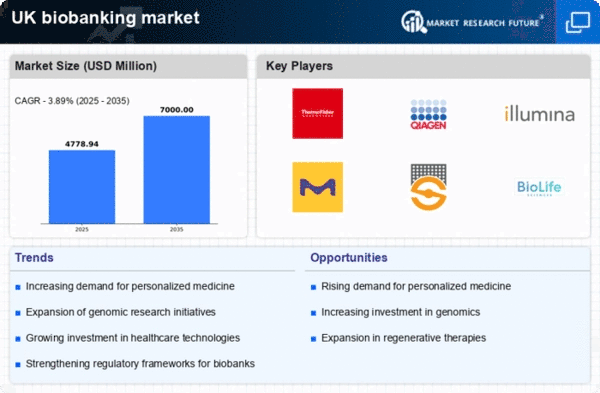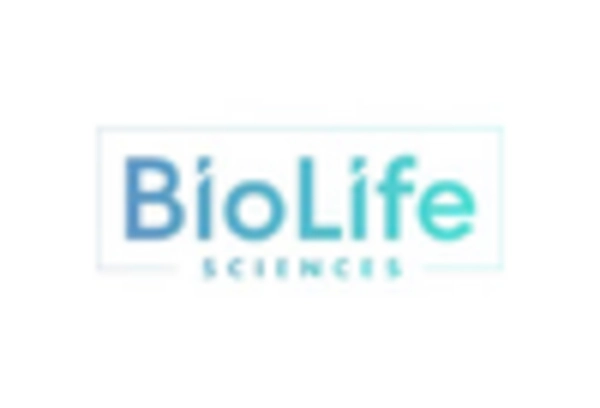Supportive Regulatory Framework
A supportive regulatory framework is essential for the growth of the biobanking market in the UK. Regulatory bodies are establishing guidelines that facilitate ethical biobanking practices while ensuring the protection of donor rights. Recent updates to regulations have streamlined the approval processes for biobanking initiatives, encouraging more institutions to engage in biobanking activities. This regulatory support is crucial for fostering innovation and collaboration within the biobanking sector. As the regulatory landscape continues to evolve, it is expected that the biobanking market will experience increased stability and growth, attracting further investment and participation from various stakeholders.
Growing Demand for Personalized Medicine
The biobanking market is experiencing a notable surge in demand for personalized medicine, driven by advancements in genomics and biotechnology. This trend is reflected in the increasing number of biobanks that are being established to support research and development in this area. In the UK, the market is projected to grow at a CAGR of approximately 8% over the next five years, as healthcare providers and researchers seek to tailor treatments to individual genetic profiles. The integration of biobanking with personalized medicine not only enhances patient outcomes but also fosters innovation in drug development, thereby expanding the biobanking market. As a result, stakeholders are increasingly investing in biobanking initiatives to capitalize on this growing demand.
Increased Public Awareness and Participation
Public awareness regarding the importance of biobanking is on the rise, which is positively influencing the biobanking market. Educational campaigns and outreach programs are encouraging individuals to participate in biobanking initiatives, thereby increasing the availability of diverse biological samples. In the UK, participation rates in biobanking studies have improved, with estimates suggesting that over 30% of the population is now aware of biobanking's role in advancing healthcare. This heightened awareness not only facilitates the collection of valuable data but also fosters trust between the public and biobanking institutions. As more individuals engage with biobanks, the market is likely to expand, providing researchers with a broader array of samples for their studies.
Rising Investment in Research and Development
Investment in research and development (R&D) is a critical driver for the biobanking market, particularly in the UK. The government and private sector are allocating substantial funds to support biobanking initiatives, which are essential for advancing medical research. In 2025, R&D expenditure in the UK is expected to reach £45 billion, with a significant portion directed towards biobanking projects. This influx of capital enables the establishment of state-of-the-art biobanks equipped with advanced technologies for sample collection, storage, and analysis. Consequently, the biobanking market is likely to benefit from enhanced capabilities, leading to improved research outcomes and increased collaboration among academic institutions and industry players.
Technological Integration in Biobanking Operations
The integration of advanced technologies into biobanking operations is transforming the landscape of the biobanking market. Innovations such as artificial intelligence, machine learning, and blockchain are being adopted to enhance sample management, data analysis, and security. In the UK, biobanks are increasingly utilizing these technologies to streamline processes and improve efficiency. For instance, AI-driven analytics can optimize sample selection for research, while blockchain ensures the integrity and traceability of biological samples. This technological evolution not only boosts operational efficiency but also enhances the overall quality of biobanking services, making them more attractive to researchers and healthcare providers alike.
















